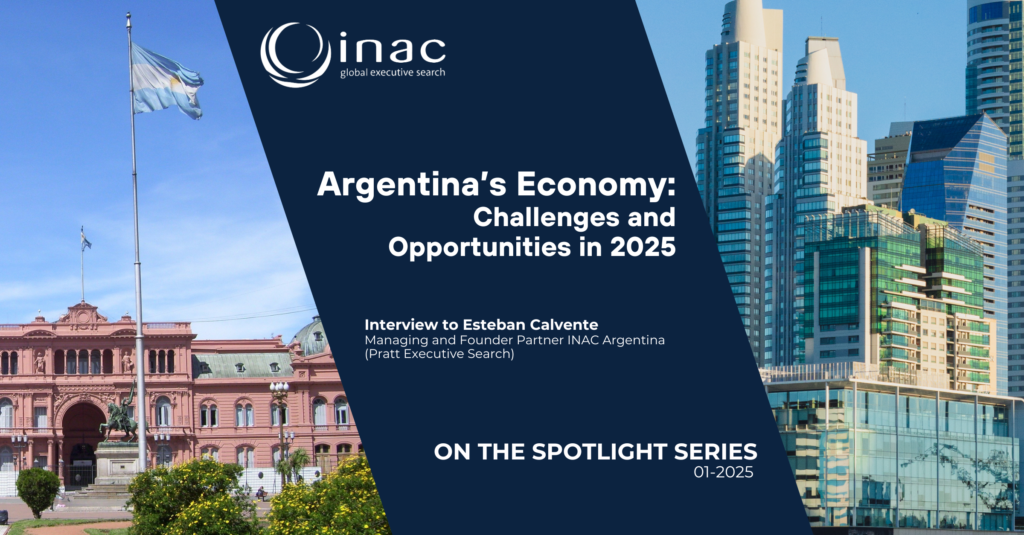
Argentina stands at a crucial moment in its economic journey. After years of turbulence and uncertainty, the country is beginning to see signs of stabilization, with inflation projected to decline significantly and economic growth on the horizon. However, challenges like exchange rate restrictions, a high tax burden, and political volatility remain significant obstacles.
In this edition of On the Spotlight Series, we sit down with Esteban Calvente, Managing Partner of Pratt Executive Search and our exclusive partner of INAC Global in Argentina, to explore the current economic landscape.
Below you will find Esteban’s perspectives on Argentina’s evolving economic conditions, the challenges businesses face, and the strategies they are employing to drive growth and resilience to lead Argentina into a brighter future.
1. What is your current assessment of Argentina’s Economy, and how is it influencing business operations?
Argentina faces a challenging economic outlook with promising signs of improvement. Inflation, project to drop from 140% in 2024 to just over 36% annually in 2025, coupled with an estimated growth rate of 5% and a revaluation of the peso, presents and environment of cautious optimism for business. For the first time in years and successive governments that there is an encouraging outlook for Argentina. However, eliminating exchange restrictions and bridging the gap between official and parallel currency rates remain critical challenges.
2. What are the biggest economic challenges companies in Argentina face today, and how are they addressing them?
One of the biggest challenges companies in Argentina face today is inflation. Operating costs are continually rising, while consumer purchasing power is declining, creating a difficult environment for businesses to thrive.
Another significant issue is the country’s strict foreign exchange regulations. These restrictions limit the ability to import essential supplies and make it hard to attract much-needed foreign investment. The tax burden is also a pressing concern. Companies here face some of the highest tax pressures in the region, which significantly impacts their profitability and operational flexibility.
Access to financing is another obstacle. With high interest rates, credit availability is limited, making it challenging for companies to fund growth or navigate short-term cash flow needs.
Finally, political instability adds to the uncertainty. A divided Congress and a polarizing presidential style create an unpredictable business environment that companies must content daily.
Despite these hurdles, Argentine companies are demonstrating resilience and creativity. Many are focusing on increasing local production to reduce dependence on imports. They are also leveraging promotions and strategic pricing to sustain consumer demand. Furthermore, businesses are actively exploring new partnerships and collaborations to find innovative solutions to these economic challenges.
3. Which sectors are most affected by the current economic situation, and how are they adapting to maintain growth and competitiveness?
The manufacturing sector is among the hardest hit by the current economic situation. With import restrictions posing significant challenges, many firms are prioritizing local production to mitigate the impact of these difficulties. This shift requires agility and a focus on optimizing domestic resources to meet demand.
In the retail and mass consumption sector, the primary issue is the decline in consumer purchasing power. To address this, companies are implementing aggressive promotions and discounts to sustain demand and maintain competitiveness in a challenging market environment.
Agriculture, a cornerstone of Argentina’s economy, is also facing significant pressures. High tax burdens and international price volatility are key challenges for this sector. To navigate these issues, agricultural businesses are relying on resilience and innovative approaches to adapt to the shifting economic environment while continuing to drive growth.
4. How are local and regional companies in Argentina positioning themselves to attract foreign investment and drive economic recovery?
To attract foreign investment and contribute to economic recovery, many Argentine companies are fostering strategic alliances with international partners. This is particularly evident in sectors like technology, renewable energy, and agriculture, where collaboration can drive innovation and growth. Additionally, several provinces are establishing special economic zones that offer tax incentives to investors. These zones aim to create an attractive environment for foreign businesses looking to expand into Argentina.
Another key area of focus is the knowledge economy. Argentina has a robust ecosystem in software development and technology services, supported by globally competitive talent. This sector is a significant draw for international companies seeking skilled professionals and cutting-edge solutions.
However, it is important to note that complex regulations and capital controls continue to pose challenges for attracting foreign investment. Despite these barriers, local and regional companies are leveraging their strengths and positioning themselves strategically to seize opportunities in the global market.
5. What opportunities or risks do Argentina’s economic conditions present for global companies looking to enter or expand in the market?
Argentina’s current economic conditions present a mix of opportunities and risks for global companies considering market entry or expansion.
On the opportunities side, one notable advantage is the competitive labor costs when measured in USD terms. This makes Argentina an attractive destination for businesses seeking cost-efficient operations. Additionally, there is a growing demand for foreign expertise and capital in key sectors such as energy, infrastructure, and technology, which are pivotal to the country’s development. Furthermore, the expanding middle class continues to drive consumer demand, creating opportunities for companies targeting retail and consumer markets.
However, global companies must also navigate significant risks. Regulatory unpredictability and high taxation can complicate business operations and planning. Currency volatility and challenges related to profit repatriation remain persistent concerns, particularly for multinational corporations. Social unrest, often stemming from economic instability, is another factor that businesses must carefully consider when evaluating Argentina as a potential market.
Despite these risks, with the right strategies and adaptability, global companies can find promising opportunities in Argentina’s evolving landscape.
6. What is your outlook on Argentina’s economic growth in the medium and long term, and which industries are likely to emerge stronger?
In the medium term, Argentina’s economic growth will largely depend on the successful implementation of structural reforms, the restructuring of its debt, and the pursuit of effective stabilization policies. These measures are essential to addressing the country’s persistent economic challenges and laying the groundwork for sustainable development.
Over the long term, however, Argentina holds a huge potential. The country’s abundant natural resources, strategic geographical location, and skilled human capital position it as a promising player in the global economy.
The energy sector stands out, particularly due to Argentina’s extensive shale oil and gas reserves in Vaca Muerta, which offer significant opportunities for export growth and energy development. Similarly, the technology and knowledge economy are poised for expansion, driven by the growing global demand for IT services and digital exports, areas where Argentina’s talent pools are highly competitive.
Agribusiness, as a global leader in food production and exports, has substantial opportunities to innovate and expand into value-added products, while the renewable energy sector is gaining momentum thanks to increasing government support and a global focus on green energy solutions.
These industries represent pathways for Argentina to emerge stronger and more competitive on the global stage, provided the necessary reforms and investments are realized.
7. What are the emerging trends in workforce dynamics and economic policy that business should be aware of over the next five years?
The workforce and economic policies in Argentina are undergoing significant transformations, with several trends likely to redefine how businesses operate in the coming years.
One of the most prominent shifts is the increasing adoption of remote work, particularly in the technology sector. Argentine talent is becoming more integrated into global markets, with companies employing professionals for international projects, further globalizing the country’s workforce.
Additionally, economic challenges are fostering a rise in entrepreneurship. Innovation is thriving in sectors such as fintech, agri-tech, and e-commerce, where startups are addressing local and international market needs through creative solutions.
Discussions around labor law reforms are also expected to gain traction. Efforts to modernize outdated regulations and introduce greater flexibility will aim to align Argentina’s labor framework with contemporary workforce demands, potentially making it easier for businesses to adapt and grow.
Digitization is another critical trend, as automation and digital platforms are becoming indispensable across various industries. Companies are investing in technology to enhance efficiency and remain competitive in an increasingly digital world.
Finally, economic reforms may play a pivotal role in shaping the business environment. Policymakers are likely to prioritize measures such as fiscal consolidation, exchange rate unification, and export incentives to stabilize the economy and encourage growth.
Together, these trends present both opportunities and challenges for businesses navigating Argentina’s evolving economic landscape over the next five years.
8. What advice would you give to leaders on fostering resilience and innovation to thrive in Argentina’s current and future economic landscape?
In the face of Argentina’s evolving economic challenges, resilience and innovation are key to ensuring long-term success. One critical strategy is diversifying operations, whether regionally or globally. By spreading risk across different markets, companies can better withstand local economic fluctuations.
Leaders should also adopt agile strategies to navigate frequent policy changes and regulatory shifts. Flexibility and quick adaptation to new circumstances will provide a competitive edge in a highly dynamic environment.
Investing in skilled talent is equally important, particularly in industries where Argentina has a competitive advantage, such as technology, agriculture, and energy. Retaining top performers and fostering their growth can drive sustained innovation and productivity.
Another essential piece of advice is embracing technology. Companies that leverage digital tools and automation can streamline operations, improve efficiency, and mitigate risks, positioning themselves as leaders in their sectors.
Finally, building strategic alliances with both local and international partners can unlock new opportunities for collaboration, resource sharing, and market access. Partnerships are a powerful way to amplify impact and drive mutual success.
By combining these approaches, leaders can foster resilience and innovation, ensuring their organizations are well-positioned to thrive in Argentina’s complex and shifting economic landscape.
In conclusion, while Argentina’s economic challenges are substantial, the country also holds remarkable potential for growth and innovation. The adaptability of businesses and the strategic use of Argentina’s natural resources, skilled workforce, and growing sectors like technology and renewable energy present significant opportunities.
Leaders must remain agile, foster resilience, and continue to invest in talent and technology to navigate both current and future economic landscapes. By embracing these strategies, companies cannot only weather the storms but also capitalize on Argentina’s promising long-term prospects for sustainable growth.
_____________________________________

Esteban Calvente, Managing and Founder Partner, INAC Argentina (Pratt Executive Search)
With a background in International Commerce and Human Resources Direction, complemented by expertise in digital transformation, Esteban brings a strategic perspective to supporting leading companies across industries.
Previously, Esteban held key roles such as Project Manager at Sud Petrol and as a government official at the National Directorate of Commercial Promotion in Argentina, contributing to impactful initiatives in trade and business development. As our former Board Member, Esteban actively influenced the network’s growth and global collaboration efforts.